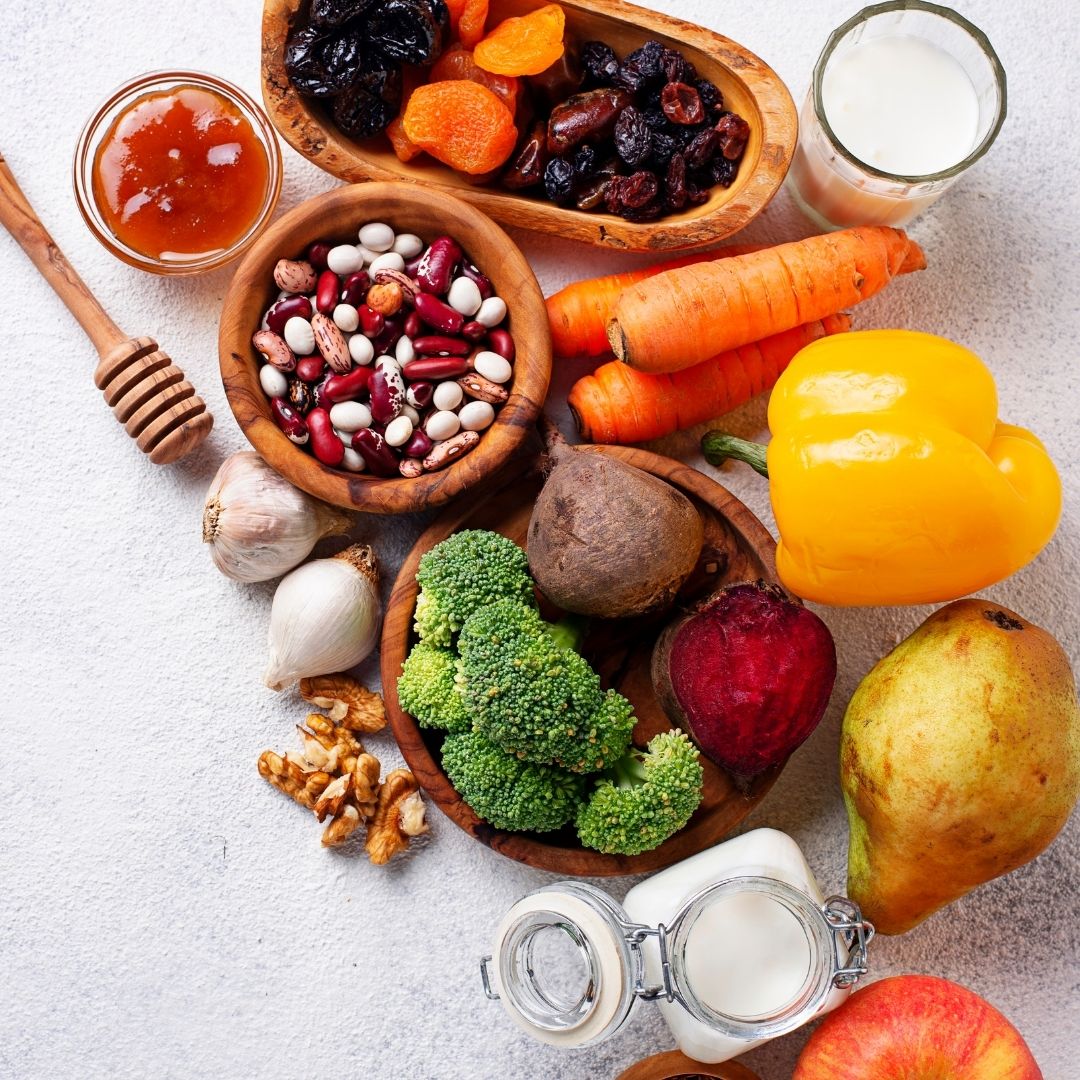
Beauty of Balance: Analysing acne, and how nutrition can affect the skin
Although health has become almost impossible to define, we believe that the true core of health is found from discovering balance from within.
At Kurami, we aim to provide nourishment to our beloved customers through our delicious and nutritionist-approved meal paths, however in order to take our mission one step further, we want to advocate what the importance of finding balance and building a positive relationship with food has for our health. We are partnering with psychodermatologist, Dr. Alia Ahmed, in our new series “The Beauty of Balance” where she and our Kurami nutritionist Georgine, discuss the importance of finding balance in diet and lifestyle, and the impact that this has on the skin.
To launch our Instagram Live series, we have come together to discuss Acne—a common skin problem experienced by all ages. This episode excellently explores the relationship between skin health and one’s diet, whilst also delving deeper into certain medical treatments and lifestyle triggers in relation to acne.
Watch the full Instagram live here.
G: Good morning, Dr. Alia! We are pleased to have you back with us to discuss the correlation between the skin and nutrition. For our new viewers, would you like to describe your role as a psychodermatologist?
I am a consultant psychodermatologist, and I have a special interest in the psychological impact on skin conditions. Psychodermatology is the part of dermatology that looks at the mind and skin together when we see a patient that has a skin problem; a common one being acne. We also look at lifestyle management; this includes diet management, exercise, stress and relationships.
G: Today our topic is acne, a common skin issue. What is the root cause or main triggers of this issue?
Rightly so, acne is a common skin problem, and about 80% of us will have had some acne during our lives. It is one of the most common skin problems that people will remember into adulthood.
Acne requires 3 things to exist: oils or sebum; a nice, greasy environment. The right bacteria; certain bacterias are more likely to cause acne. And finally, pore clogging. These 3 factors create the perfect environment for a spot to form. In terms of bacteria, we all have bacteria living on our skin. Some skin may react to it, however some skin may not. This all comes down to genetics, as well as the lifestyle of the individual which is why we take all things into account, including everything from diet to family history.
There are also a few common triggers. One of them is hormones; this is why we tend to see acne commonly in teenagers, and now, within older females. This form of acne is known as “adult female acne” and this may be related to hormonal imbalances.
Stress is also a potential trigger for acne. When you are feeling stressed, your skin is producing more oils, therefore you are enriching the environment for a spot to form.
Additionally, we have occlusion. This includes having something on your face all the time, whether it be a mask or your mobile phone.
G: What do you usually recommend to those who suffer with acne?
Usually there is an algorithm that we use because it is well-tested. Firstly, oral antibiotics, creams or lotions are offered. Other medical treatments include creams that include active ingredients such as benzoyl peroxide which is an anti-inflammatory that helps with bacteria and pore clogging. Topical retinoids or retinoids are similar to this. For the more superior end of the spectrum, acne can respond better to oral treatment with the retinoids such as accutane. Acne that appears to have a hormonal trigger is treated with hormonal regulating medications.
Acne can also be managed with lifestyle and diet, and it is important that I am able to advise them in this area as well, in addition to the medical treatment.
A: As a nutritionist, how do you believe people can further support their skin health with regards to acne?
When it comes to nutrition, specifically looking at acne conditions, there does not seem to be a wide array of research. There is limited evidence when it comes to suggesting that certain nutrients might have a more direct effect on acne, such as the amount of free sugars in a diet. The idea behind this is that the larger amount of free sugars in a diet, the more likely your body is able to produce insulin. This can trigger the increase of oil produced by certain glands.
In terms of looking at diet, particularly when discussing acne, it is the overall diet that we need to look at, not looking at one sole nutrient. Those who tend to eat a high amount of free sugars may be lower in certain nutrients that are beneficial to their overall health. It is important to eat an abundance of dietary fibre, whole grains, as well as fruits and vegetables.
It truly can be complicated, which is why it is important to look at health on a holistic level.
G: Moving further from food, do you believe stress or emotions play a role in acne?
They definitely play a role in acne, which is mediated by the stress pathway. We all have a stress pathway in our brains, which produces the stress hormone known as cortisol that can have an effect on multiple organs. This can cause skin disease or worsen current skin disease. This can be implicated in acne as a higher level in cortisol can increase the production of sebum, therefore disrupting the skin barrier. This then can also impair wound healing; for example you have a spot and the skin barrier is compromised, it can take longer for the wound to heal.
We also know that having acne has a lot of psychological impact, which causes further stress! This becomes a vicious cycle. Therefore addressing stress management is important when treating patients with acne, as well as medical treatment.
G: What practices do you believe can bring balance inside and out, to help regulate acne?
This new series is all about balance, and the key to achieving balance is working on your mental wellbeing. This does not mean that all of your medical problems will disappear when you find balance within yourself, but you are more likely to be able to cope with them better. Emotional distress can cause skin problems, therefore managing this is important. This can also feed into your confidence, allow you to work on your emotions, push you to become more productive, and so much more!
A few things that I tell my patients to do is to engage in some form of meditative practice daily; whether it be reading, exercising, or spending 5 minutes with yourself. This is a positive way of adapting your mental state.
When staying at home especially, it is important to manage this environment; incorporate things that you like! What we know is that adapting your environment to what makes you feel good can benefit your mental health positively, and elevate your mood in general. It is important to also feel sad, however acknowledge this feeling! Acknowledging low mood can enhance the way that you are able to deal with your emotions, whilst also taking away its power. Think about how to deal with that negative rather than letting it linger all day.
G: At Kurami, we are ever-creating new and nourishing meals and drinks to spruce up our meal paths. What is the importance of eating nutrient dense food with regards to the skin?
The discussion of nutrition is now very common with my clients! It is important to have a healthy, well balanced diet as it can have a positive impact on the skin bacteria; this is usually from the gut. We had talked about this on our last live, so I encourage people to watch this as well as we were able to discuss this topic at length.
What I suggest to people is having a proactive approach to your diet; focus on meal management, look at your ingredients, incorporate nourishing foods! Nourishing your body through your diet does not have to be super expensive, it just requires planning. What we spoke about before is the importance of gut bacteria; implementing this into your diet can have a role in managing skin health and skin disease.
A: What can we expect from Kurami throughout the winter? Are new and nourishing meals on the horizon that can help people easily find nourishment and balance through their meals?
Absolutely! As Christmas approaches, we have prepared an array of new and nutritiously delicious additions to the Kurami meal paths, which are all nutritionist approved and prepared by our talented chefs. We have recreated many Christmas classics that are nutrient rich, and filled with flavour.
At Kurami, we hope to bring forth at least 30g of fibre to our customers when creating our meal paths, which is the government recommendation. In the UK the average intake of dietary fibre is only 18g a day—it is not good enough. When eating dietary fibre such as vegetables, whole grains, beans and pulses, this can benefit in feeding the gut microbiome.
With foods rich in dietary fibre, we tend to eat slower as well, allowing us to register our feelings of fullness. Sometimes in the nutrition world, we tend to focus on the specific nutrient, but sometimes it is how we eat that plays a role in our overall health.
G: To finish off our discussion, what are 3 habits that our audience can practice throughout the winter to maintain balance, and discover beauty from within?
I already alluded to one, and this concept of mindful eating is something that I am trying to practice myself. When you are having your meal, remove distractions and focus on your food—focus on chewing properly! This is something that is almost meditative. Meditation can be a physical activity as well. When eating, really feel, taste, and chew the food. This also encourages the gut to properly process the food, therefore supporting the microbiome.
As the weather is getting colder, hydration is important! This hydrates your body and your skin. I recommend drinking 2-2.5 litres of water a day, as well as incorporating foods with a high water content.
Also, addressing diet is important as it contributes to your overall health. With the current situation, physical activity is going down, therefore a good diet is important in managing weight and making sure that you stay nourished. This can be done through having a balanced, fibre-rich diet. Probiotics can also improve the skin barrier function in humans and in animals. Overall, so many positive things can come out of having a nourishing, nutrient dense diet.
Overall…
Managing acne goes beyond solely focusing on certain medical treatments, or changing your diet. It is not a straightforward process and there are many aspects that are to be considered when looking at skin health. However, Georgine and Dr. Alia exhibit that, through maintaining a well-balanced lifestyle, and especially eating an abundance of nourishing foods, this can be beneficial for your overall health, and in turn, work to guide the body in improving any skin condition, including acne.
KURAMI is a premium meal delivery service with a unique focus on gut health. All KURAMI meals are nutritionist approved, and chef crafted, to ensure clients receive balanced and delicious meals ready to eat, right at their doorstep.
Discover beauty from within. Order your meal path now, and begin your journey with us today. Follow us on instagram here.
Dr Alia sees NHS patients in the Frimley Health Foundation Trust. She consults privately at The Bridge Clinic (Maidenhead) and Epsom Skin Clinic. Please click here to find out more about Dr Alia, or follow her on instagram here.



